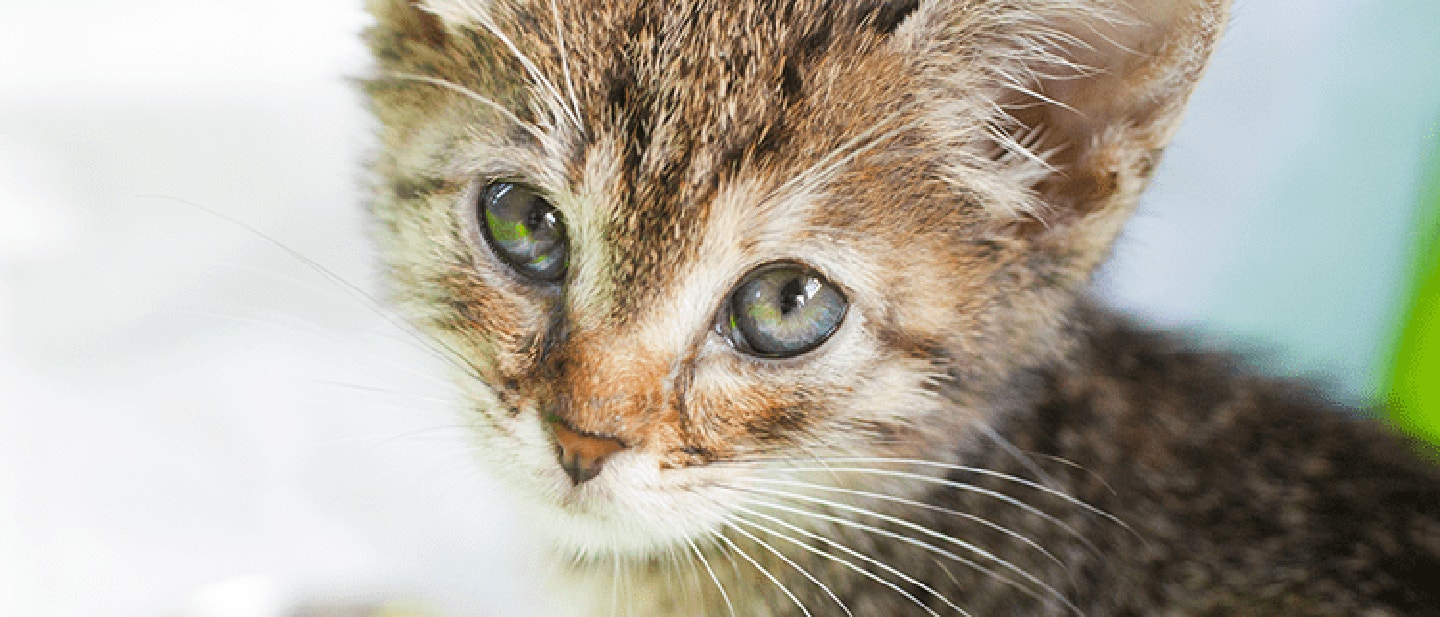
SIGNS YOUR KITTEN IS TEETHING & WHAT YOU CAN DO

Article checked by a vet
Like babies, kittens are born with no teeth and have to go through the process of teething - twice! Generally, kitten teething may cause mild discomfort, but should not cause pain. Each kitten is different; some are more sensitive to teething pain than others. Luckily there are things you can do to help ease your feline friend’s teething.
In this article, we aim to answer your questions about the process, such as when kittens lose their baby teeth, what’s normal behaviour during teething and what’s not, as well as tips to soothe teething discomfort.
Stages of Kittens Teething
There are different stages to kitten teething, as kittens make their journey from baby teeth to adult teeth. Kittens are born without teeth; they start teething between 2-4 weeks of age with the deciduous (milk teeth) erupting through the gums. At about 8 weeks old, kittens will have a full set of 26 baby teeth - but not for long! Between 12-14 weeks old, those teeth will start to fall out as they are replaced with adult teeth. By 6-7 months old, kittens should have all 30 of their adult teeth. Below, you can learn when kittens lose their baby teeth and which teeth kittens lose first.
2-4 weeks
When your kitten is between 2-4 weeks, their milk teeth begin to erupt through the gums. This starts with their incisors, followed by their primary canine teeth.
1-2 months
The rest of the teeth follow through fairly quickly. Your kitten’s baby teeth should all be through by the time they are 2 months old, and you should be able to count 26 in total - if your kitten lets you!
3-4 months
Shortly after your kitten starts weaning from their mother’s milk around 3 weeks of age, kittens will begin to lose their baby teeth. Then, their adult teeth emerge in a similar pattern - incisors first, then canines and premolars, and finally the molars.
By the time your kitten is 6-7 months old, they should have 30 adult teeth in total. These are sharper, so maybe don’t try to count them yourself!
Signs Your Kitten is Teething
Teething does not usually cause pain to your kitten, however they will experience some discomfort in their mouths during this time. Below are the most common signs that your kitten has started teething.
Vocalising
Your kitten may be more vocal than usual as they try to communicate their discomfort to you. They may meow quietly or loudly to let you know something is going on, and that they’re not happy about it. Try to comfort your kitten when they do this by grooming them, as most cats and kittens love to be brushed.
Bleeding Gums
Baby teeth come and go quite quickly, without most owners noticing. However, adult teeth are larger and take longer to erupt through the gums. You may notice a tiny amount of blood when a baby tooth falls out, but if you see any blood in and around your kitten’s mouth, it’s worth investigating further in case a vet appointment is necessary.
Not eating their food
If your kitten has mouth pain whilst teething, they may be too uncomfortable to eat. Whilst reduced appetite is a common sign of teething, your cat can become seriously ill without food. You can offer wet food or moistened dry food which requires less effort for your kitten, making it easier for them to eat. However, there could be other reasons your cat is not eating, so if it has been more than 24 hours since your kitten’s last meal, you should take them to the vet immediately to rule out any medical illnesses.
Irritability
We’ve all been on the receiving end of a cat’s mood swings. If your kitten is feeling grumpy or irritable for no apparent reason, it could be due to discomfort from teething. You can give your kitten some space, or cheer them up with some play and affection to distract them from any pain. Kittens love to chase a rolled up ball of paper, and no cat can ever resist investigating an empty cardboard box - either of these games will provide hours of fun and distraction!
Missing teeth
An obvious sign of teething is if your kitten loses their baby teeth. You may find teeth around your home, although it’s also common for kittens to swallow their baby teeth when they fall out so your kitten’s teething process may go entirely unnoticed.
Chewing
You might notice your kitten biting determinedly on a toy, or other soft or rubbery objects, to relieve some pressure from teething. As long as their choice isn’t dangerous, such as an electrical cord, this is usually fine. This may not have anything to do with teething at all, and could just be your kitten indulging in their natural hunting instincts!
Alternatively, you may notice your kitten taking longer to finish their meals as they are eating slowly. This is likely due to the tenderness of their emerging teeth, which is why it's best to offer moistened dry food or wet food.
Pawing At Mouth
If your kitten has a loose tooth, you may see them shaking their heads and pawing at their mouths to try and dislodge it. They could also be pawing if their mouth feels sensitive, so if your kitten winces when you touch their face, they are likely teething.
Drooling
If your kitten is mildly drooling, it could be a sign they are teething. Be sure to check their mouth to confirm if it is teething, and not a sign of a mouth injury or a reaction to something else.
Decreased grooming
Naturally, if your kitten is experiencing pain from teething, they may not want to engage in their usual activities as much. Your kitten may find it uncomfortable to groom themselves, but you’ll find most kittens soon perk up if you offer to groom them with a soft, bristled brush.
Does teething hurt kittens?
Teething is not expected to hurt kittens or cause any extreme pain, however it is normal for your kitten to experience some discomfort when they start teething. Their gums may feel a bit sore when their adult teeth come through, as these are firmly rooted in their gums. Some kittens may feel more sensitive to teething pain than others, however if your kitten shows distress from pain then you should take them to the vet immediately in case they have any other issues.
How to soothe your kittens teething pain?
Teething can be a difficult time for kittens, which is why we’ve listed some suggestions below on how to help when your kitten starts teething.
Soft food
If your kitten is experiencing discomfort in their mouth, they may find it difficult to eat. You can offer wet food or soak dry food in warm water to make it softer, so your kitten finds it easier to eat.
Chew toys
Some kittens will enjoy biting on objects to relieve their pain. It’s important to cat-proof your home so they’re not inclined to bite electric cords or anything dangerous. You can find cat-safe toys that are soft and made of either rubber or plastic, although you should supervise them whilst they use these and throw away any damaged toys.
Wet cloth
Rather than purchasing toys, you can repurpose some cloth at home by knotting it into different shapes for them to bite or chase around.
Interactive play
Sometimes the best option for your kitten’s teething is distraction. Engage in interactive play with your kitten to keep their mind off the pain. They will appreciate the love and affection, and will likely relax into a long snooze afterwards. You can opt for a rolled up ball of paper, and empty cardboard box, or even blow bubbles for your kitten to enjoy.
Why is your kitten’s oral hygiene & health important?
It’s essential you prioritise your kitten’s oral hygiene and health from a young age. Unfortunately it is common for cats to experience dental issues and gum disease (known as gingivitis, which can escalate into periodontal disease), so establishing a dental care routine early is good practice.
You can support your kitten’s oral hygiene by regularly brushing their teeth using a cat-safe toothpaste, although you should wait until their adult teeth have come through as their gums are sensitive during teething. You can also offer PERFECT FIT™ Kitten 2-12 Complete Dry Food, as dry food has a naturally abrasive texture, which is known to help prevent the build-up of plaque and tartar.
There are other dental issues that can occur during teething. For example, there is a rare condition where if a kitten’s baby teeth don’t fall out, it can prevent adult teeth from coming through, or cause overcrowding and/or misalignment. If you notice your cat still has baby teeth when teething for adult teeth, or any other signs of infection such as inflamed gums with discharge, take your kitten to the vet for an examination.
